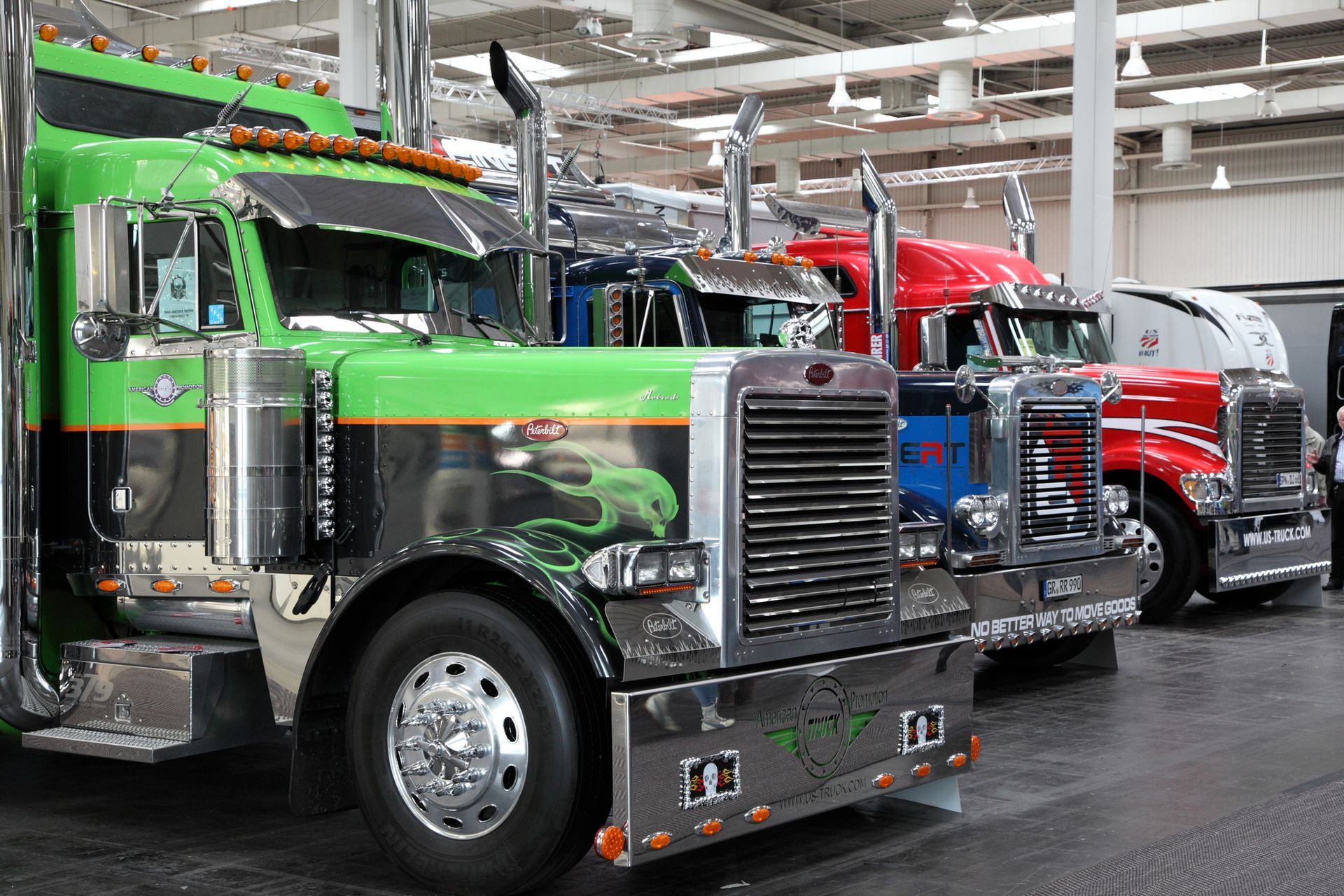Disability Insurance for Truck Drivers
Call (469) 905-4422 for a Free Disability Insurance Quote!
Driving a truck for a living takes skill, endurance, and commitment. Whether you’re hauling freight cross-country or making regional deliveries, your income depends entirely on your ability to stay healthy and behind the wheel. But what happens if an accident, injury, or illness puts you out of work?
For truck drivers, disability insurance is one of the smartest forms of financial protection you can own. It replaces a portion of your income if you’re unable to drive due to an injury or illness, giving you stability while you recover. Think of it as income protection for the career you’ve built one mile at a time.
Why Disability Insurance Matters for Truck Drivers
Driving is demanding work. Long hours, heavy lifting, and sitting for extended periods all take a toll on your back, legs, diet, and overall health. Accidents are an ever present risk, even for careful drivers. If you’re a W2 employee driver, workers compensation may cover injuries that happen on the job, it won’t help if you get sick or injured off duty, or develop a condition like severe back pain, diabetes complications, or heart issues that prevent you from passing a DOT medical exam. Owner operators do not have workers compensation coverage as they are not considered employees.
That’s where disability insurance comes in. It pays you a portion of your income, typically 60 to 70 percent if you’re unable to work due to illness or injury. It allows you to pay your bills, keep your home, and protect your family’s lifestyle while you focus on getting back on your feet.
Most policies cost around 1 - 3% of your annual income, depending on your age, health, and coverage level. A small percentage to protect everything you built to this point.
The Three Main Ways Truck Drivers Get Disability Coverage
Every driver’s situation is different. Some are company employees, others are owner-operators or independent contractors. Understanding where coverage comes from helps you figure out what you have, and what you still need.
1. Government Disability Programs
Social Security Disability Insurance (SSDI) is available to workers who have paid into Social Security, but it only applies if you’re unable to perform any kind of work. That means if you can still do a desk job or lighter-duty role, you might not qualify. The benefits are modest and the approval process is slow. SSDI can help, but it’s not enough to rely on by itself.
2. Employer or Union Group Plans
Some large trucking companies offer group disability insurance as part of their employee benefits. These plans are convenient but limited:
- They may replace only a portion of your base salary, not bonuses or mileage pay.
- The definition of disability may require that you be unable to work in any occupation, not just driving.
- Coverage ends if you change jobs or move to an independent contractor role. If you have a private policy, you own it, it stays with you forever.
- Benefits are taxable if your employer pays the premium.
If you’re a company driver, group coverage is a good start—but for most, it’s not enough.
3. Private Individual Disability Insurance
Independent truckers and owner-operators often purchase private disability insurance to protect their income on their own terms. A private policy is fully customizable, portable, and stays with you no matter who you haul for.
It’s especially valuable for self-employed drivers who don’t get company benefits. You can choose your monthly benefit amount, waiting period, and benefit length to match your situation. Private coverage also offers own-occupation definitions, which protect you if you can’t perform the specific duties of truck driving, even if you could work in another field. If you can’t drive a truck, you get paid.
Understanding “Own-Occupation” Coverage
The term own-occupation refers to how the policy defines disability. Under an own-occupation policy, you’re considered disabled if you can’t perform the regular duties of your specific occupation, even if you could do another job.
For truck drivers, that means if a back injury, shoulder issue, or sleep disorder keeps you from safely driving, you can collect benefits, even if you’re capable of working part-time at Home Depot.
Some lower-cost policies use an “any occupation” definition, which only pays if you’re unable to work in any job at all. That’s a much harder standard to meet, and one reason private own occupation disability insurance coverage, is worth considering if you can qualify.
How Your Truck and Routes Affect Your Coverage
Not all trucking jobs are viewed the same way by disability insurance companies. Three key factors influence your policy terms and pricing: the type of truck you drive, what you haul, and how long you're on the road.
Truck Size Matters
The size of your vehicle plays a role in underwriting. Drivers operating smaller commercial vehicles typically receive more favorable occupation classifications than those driving Class 8 semi-trucks. This affects both your premium, and the policy features available to you.
What You Haul
Your cargo matters. Transporting hazardous materials, oversized loads, or certain regulated goods will result in different underwriting treatment than hauling standard freight or packaged goods. Insurance companies assess risk differently based on what you're moving from point A to point B.
Local vs. Long-Haul
Where you sleep at night significantly impacts your coverage options and cost. Drivers who return home daily are offered better occupation classes and lower premiums than those spending nights on the road. Even occasional overnight hauls can shift you into the long-haul category for underwriting purposes. Like smoking status, there's little middle ground. A few overnight trips per month puts you in the same category as full-time long-haul drivers when it comes to policy pricing and availability.
Why Buying Disability Insurance Early Matters
Younger drivers often put off thinking about disability insurance, assuming they’ll deal with it later. But the earlier you buy, the better.
Rates are based on age, health, and job classification, and trucking is considered a higher-risk occupation. That means premiums rise quickly. Age and health conditions like high blood pressure, sleep apnea, or back problems, can make approval harder or lead to exclusions.
Buying early, while you’re healthy, locks in coverage and lower rates for the long haul. Once you’re approved, your policy can’t be canceled as long as you pay your premiums, even if your health changes later.
The Most Important Policy Features for Truck Drivers
When reviewing or purchasing a disability policy, pay attention to the following key features. They determine how well your coverage will actually perform when you need it.
1. Waiting Period (Elimination Period)
This is the number of days you must be disabled before benefits begin. Most drivers choose 90 days, which balances cost and practicality. If you have strong savings, you could extend it to 120 or 180 days for a lower premium.
2. Benefit Period
This is how long benefits continue if you remain disabled. You can choose terms such as 2 years, 5 years, or to age 65. The longer the benefit period, the higher the premium—but the better the long-term protection.
3. Monthly Benefit Amount
Your policy should replace about 60 - 70% of your income, which maintains your lifestyle without over-insuring. For owner-operators, benefits are based on your net earnings, not gross revenue.
4. Partial or Residual Disability Rider
Some injuries reduce your ability to work full-time but don’t stop you completely. A residual disability rider pays partial benefits if you experience a significant income loss from reduced hours or limited capacity.
5. Future Increase Option (FIO)
If your income grows over time, say you add routes or expand your trucking business, this rider allows you to increase coverage later without new medical exams.
6. Cost of Living Adjustment (COLA)
If you’re on claim for years, inflation can erode your benefit’s buying power. A COLA rider increases your monthly payments annually while disabled.
7. Non-Cancelable and Guaranteed Renewable
These terms mean the insurance company can’t cancel your policy or raise your rates as long as you pay premiums on time.
Health and Lifestyle Factors Affecting Approval
Truck driving can take a toll on your health, and insurers know it. When applying for disability coverage, underwriters look closely at:
- Height and weight
- Blood pressure and cholesterol
- Sleep apnea or other sleep disorders
- Back or joint issues
- Diabetes and heart health
They may also ask about your driving record and DOT medical certification. Working with an independent agent who understands trucking can help you find companies that treat your profession more favorably and streamline the underwriting process.
Options for Owner-Operators
If you’re an owner-operator, your financial risk is even greater. Your truck, business, and household all depend on your ability to earn. In addition to personal disability insurance, you might also consider:
- Business Overhead Expense (BOE) insurance to cover fixed expenses like loan payments, permits, and lease costs while you’re unable to work.
- Loan protection coverage to keep truck payments current if disability strikes.
These policies help you avoid defaulting on obligations or losing equipment during recovery.
Occupation Class and Income Upgrades
Owner-operators have access to special underwriting features not available to employee drivers. Many disability insurance carriers offer what's called an occupation class upgrade or income enhancement for business owners.
An occupation class upgrade allows you to apply at a higher classification than standard employee drivers, sometimes moving up one or two levels. This translates directly to lower premiums and better policy terms.
An income enhancement option lets you include certain business expenses back into your income calculation when determining benefit amounts. Since owner-operators must net out overhead costs like fuel, maintenance, and truck payments, this feature allows you to apply for higher monthly benefits than your net income alone would support. In a business with significant overhead, this can be a meaningful increase your protection level.
Not every carrier offers these upgrades, which is why working with an agent who knows which companies treat owner-operators favorably can save you thousands over the life of your policy.
Portability and Flexibility
A major advantage of private disability insurance is portability. Your coverage stays with you no matter which company you contract for or whether you switch between employee and independent status.
That’s a big deal in an industry with high turnover and frequent job changes. Once your policy is in force, it follows you wherever the road takes you.
How Disability Benefits Are Taxed
If you pay premiums with your own after-tax dollars, your disability benefits are tax-free. If your employer pays the premiums, your benefits will be taxable.
For independent drivers, paying premiums personally ensures you keep the full benefit amount during a claim.
Common Misconceptions Among Truck Drivers
“Workers’ comp will take care of me.”
Workers’ compensation only applies to injuries that happen on the job and typically doesn’t cover illnesses or conditions that develop over time.
“I’ll qualify for Social Security disability if something happens.”
SSDI is difficult to qualify for and pays much less than your regular income. It’s best seen as a backup, not your main plan.
“I’ll just rely on savings.”
A serious disability can last months or years. Replacing your income out of pocket could drain your savings or force you into debt.
“Insurance companies never pay out.”
Private disability insurers pay billions in claims every year. The key is having the right policy structure and understanding what’s covered before you need it.
Where Disability Insurance Fits in a Truck Driver’s Financial Plan
Your ability to drive is your business’s greatest asset. Every other financial goal, paying your mortgage, saving for retirement, supporting your family, depends on your paycheck.
Disability insurance serves as the income safety net that keeps everything else running. It ensures your bills are paid, your truck stays financed, and your household remains stable even when you’re off the road.
Think of it as part of your long-term financial maintenance plan, right alongside oil changes, tire pressure, and regular checkups, it keeps your financial engine running smoothly no matter what bumps you hit along the way.
How to Build the Right Plan
A solid disability protection plan for truck drivers typically includes:
- Private, own-occupation individual policy
- Benefit amount replacing 60–70% of net income
- 90-day waiting period
- Benefit period to age 65
- Residual disability rider
- Non-cancelable and guaranteed renewable terms
- Premiums paid personally for tax-free benefits
- Regular reviews as your income or contracts change
An independent agent experienced in working with drivers can compare policies from multiple insurers to find the best fit for your situation and budget.
The Bottom Line
Truck driving is more than a job, it’s a lifestyle and a livelihood built on skill, discipline, and endurance. But one accident or health issue can sideline that income overnight.
Disability insurance for truck drivers protects the paycheck that supports your family, your truck, and your future. It’s not just about replacing lost wages, it’s about keeping control of your financial life when things don’t go according to plan.
For drivers in their 20s, 30s, and 40s, now is the time to secure coverage while you’re healthy and eligible. You can’t predict every detour life will take, but with the right disability policy, you’ll always have a route back to financial stability.
Protect the road you’ve worked hard to pave.
Call
469-905-4422 for a Free Disability Insurance Quote!












